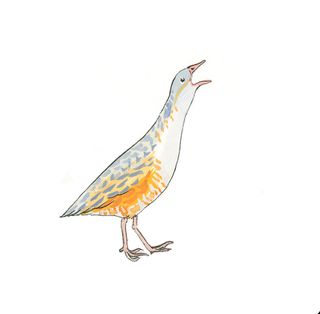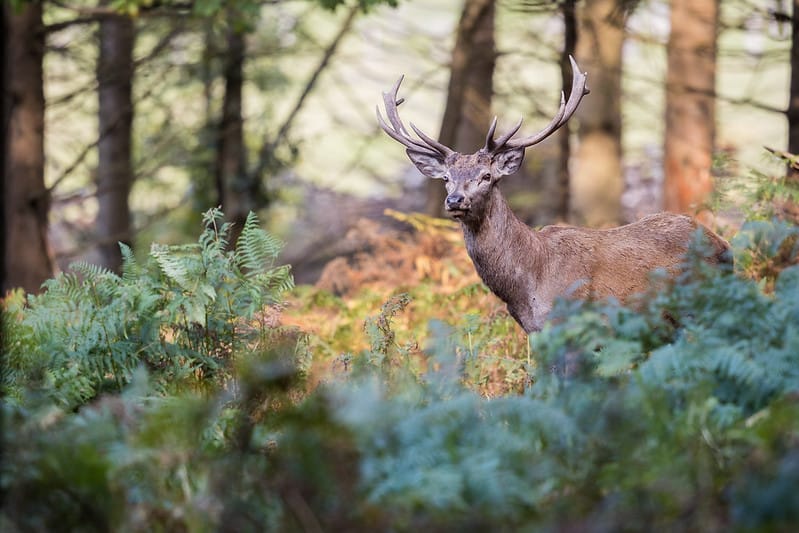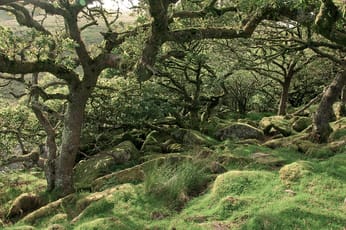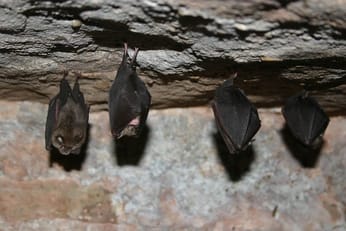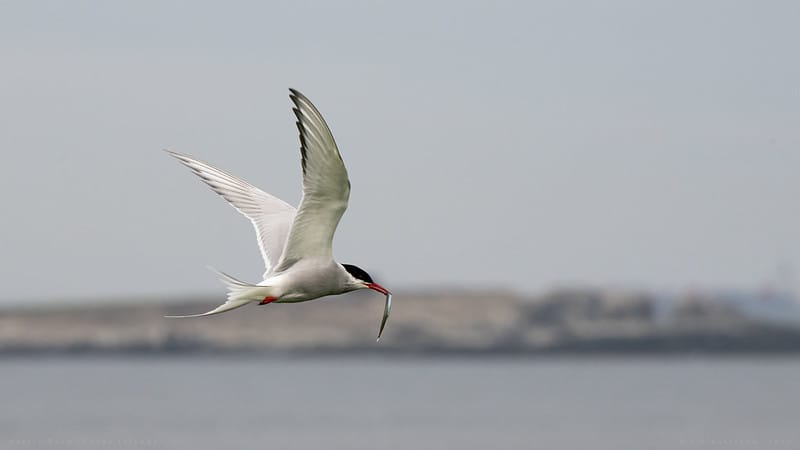
Farming Protest & Arctic Terns
The latest news on nature and conservation in Britain.
National news
Tax | Around 13,000 farmers descended on Whitehall on Tuesday, complete with placards and tractors, to protest the government’s changes to inheritance tax. The changes – which are explained in this BBC Verify video – were announced as part of the Budget, and mean that from April 2026, inherited agricultural assets worth more than £1m will be liable to the tax at 20%. This is half the usual rate, but farming was previously exempt entirely. Members of the farming community, including some 1,800 NFU members who lobbied their MPs, argue that the changes will hit family-owned farms already under pressure from rising costs. They say that most farmers are asset-rich but cash-poor, and therefore would need to sell up to pay the tax. Defra has issued a statement defending the changes, saying they are ‘balanced and proportionate’, and only around 500 claims a year are expected to be affected. Conversely, the Country Land and Business Association has estimated that up to 70,000 farms could be affected – although the BBC claims that the true number is likely to be closer to the government estimates. The protestors have vowed to escalate unless chancellor Rachel Reeves agrees to discuss solutions. The news has been covered extensively, including in the Guardian, the Times and the BBC. Read more reaction and analysis in Driftwood.
Sandeel | A coalition of 35 conservation organisations has issued a joint statement calling on the EU Commission to reconsider its position on the UK’s decision to prohibit industrial sandeel fishing in its waters. The UK announced the closure to protect stocks of sandeel, which are a key food source for seabirds – but they are also valued by fishermen for their oil and use in livestock feed. The Commission launched a challenge to the closure in April, questioning its legitimacy under the UK-EU Trade and Cooperation Agreement, which aims to ensure a level playing field for shared resources. Now, it has called for an arbitration tribunal to settle the debate. Katie-jo Luxton, director of conservation at the RSPB, said that the EU’s decision ‘flies in the face of its commitment to protect and restore marine ecosystems’, and is a ‘scandalous attempt’ to reverse the hard-won conservation victory. Chronicle Live covered the news.
Trees | Ahead of National Tree Week, the Tree Council and the Woodland Trust visited 10 Downing Street to hand over a petition calling for stronger laws to protect Britain’s most iconic trees. The Trust’s Living Legends campaign has been signed by more than 100,000 people, and it calls for a legally protected heritage status for the oldest and most important trees, as well as policy protection for a wider group of veteran trees. Adele Benson of the Trust said that the UK has an ‘incredible heritage’ of old trees, but most are outside protected areas, and the petition will send ‘a powerful message’ to the government showing the strength of public feeling on safeguarding them. The London Daily News reported the story. In other tree-related news, Woodland Trust Scotland has launched a campaign to boost trees and micro-forests on farms and crofts, and the Tree Council has partnered with software company Land App to launch a free agroforestry design toolkit aimed at farmers.
In other news:
- Environment Secretary Steve Reed has said that Defra will publish its long-awaited Land Use Framework ‘probably early in the new year’, reports ENDS.
- A conservation group has warned that red squirrels will soon vanish from England unless the government funds a vaccine against squirrelpox, reports the Guardian.
- The Office for Environmental Protection has launched an investigation into the government’s water pollution rules for farmers, reports ENDS.
- Chancellor Rachel Reeves has advised the Bank of England to consider nature-related risks, reports ENDS.
- The future of several RSPB nature reserves is at risk as the charity says it must cut costs, reports the Guardian and the Times.
- England’s national parks are facing a 12% cut in real-terms to their budget which could lead to mass redundancies, reports the Guardian.
- NatureScot has launched a digital ‘discovery map’ to support outdoor learning in schools. The Herald reported the news.
Across the country
County Durham | A million-pound project has been launched along the County Durham coastline to restore its rare habitats and create a wildlife corridor. The Coastal Grasslands Reconnected Project is a partnership between the county council, Durham Wildlife Trust and the National Trust, and will see 200 hectares restored, focusing on the wildflower-rich magnesian limestone grasslands from Noses Point to Horden. The scheme has been awarded £975,000 from the government’s Species Survival Fund; the money will support habitat management through fencing, baling and surveys, and also fund a high-tide roost area for birds at Blackhall Rocks. The initiative will also see the planting of hedgerows, trees and scrub, and the creation of ponds, to form connected areas of mosaic habitat. The BBC and the Northern Echo reported the news.
Isle of Man | A population survey has revealed that around 1,000 wallabies are thriving on the Isle of Man, many more than previously believed. The figure comes from the first island-wide population survey, which tracked the animals across 988 acres of countryside using thermal imaging technology. Brits might associate wallabies with the warmer temperatures of the Australian outback, but their natural range also includes Tasmania, where the damp and temperate weather is much closer to Britain’s climate. The Manx population is thought to originate from a small number of escapees from a wildlife park in the ‘60s, and they are now thriving in marshland areas of the island. The government is looking at the best ways to evaluate their impact on the local environment, and whether management measures are needed. The BBC and ITV covered the news.
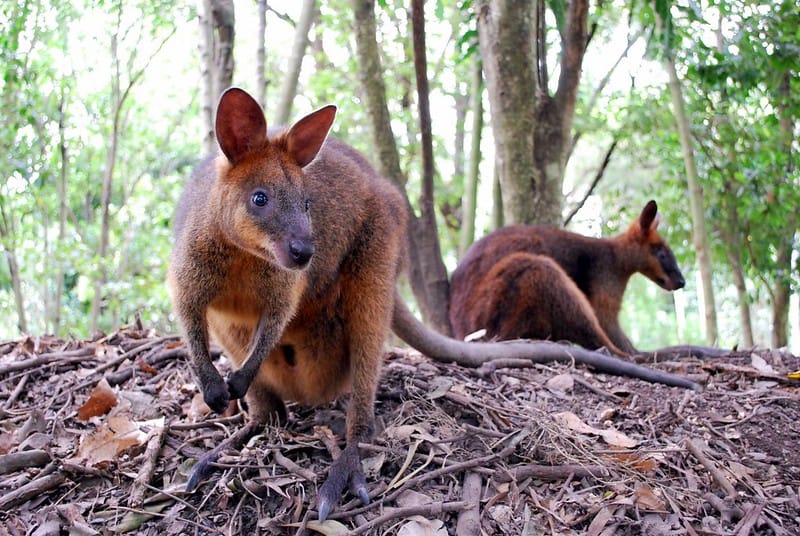
Peaks | Derbyshire Wildlife Trust has launched a network to support smaller landowners to deliver natural patterns of grazing and regeneration of habitats across the Peak District. Announcing the plan, the Trust said that grazing by large herbivores remains among the most natural and effective ways of managing vegetation, shaping the landscape in ways that human intervention cannot replace. However, landowners with smaller sites often do not have access to livestock to manage in this way. Through the Wild Peak Grazing Network, the Trust will support 11 landowners with grazing through a shared group of native Exmoor ponies, moved between the sites covering 45 hectares. The ponies will help to browse brambles, graze vegetation to different heights, encourage the growth of wildflowers, and generally create more diversity in the landscape.
Elsewhere:
- Residents of Langholm near Dumfries are battling against forestry firms who want to cover the surrounding hills in plantations of sitka spruce, reports the Times.
- The introduction of a herd of Ancient Cattle of Wales to a nature reserve in Ceredigion three years ago has boosted the number of Pied Flycatchers, reports BirdGuides.
- A deadly strain of bird flu has been detected on the Isle of May in the Firth of Forth for the first time, reports the Times, after great black-backed gulls were found dead.
- Land currently used for farming in the New Forest is set to be transformed into a 1,000 acre nature reserve as part of a natural capital scheme, reports the Daily Echo.
- United Utilities is refusing to disclose data on sewage discharges into Windermere because it is ‘not in the public interest’, reports the Guardian. Read more about the fury surrounding the situation here.
- Community interest company Wild Intrigue has launched a fundraiser to build an artificial nesting sand bank at the mouth of the Ouseburn to support Newcastle’s urban colony of sand martins, reports Chronicle Live.
- A visitor to a nature reserve in Canterbury has discovered a rare and protected fungus known as the lion’s mane fungus, reports the BBC.
- The John Muir Trust has backed the proposal for a national park in Galloway, saying it would help restore natural processes to the landscape, reports the Herald.
- Dozens of homes in west London are flushing their toilets directly into the Brent and Crane rivers due to a ‘misconnection’ in the plumbing, reports Metro.
- Coventry City Council has received £400,000 in funding and plans to plant over 350,000 trees by 2033, reports the Coventry Telegraph.
- Kent Wildlife Trust has announced a project to restore 80 hectares of chalk grassland habitat around Dover Castle and the surrounding cliffs.
- A nature credits rewilding project at Castle Howard in north Yorkshire could see the reintroduction of beavers and increases in bats and turtle doves, reports the BBC.
- A report by Friends of the Lake District highlights the need to raise more funds to tackle the impacts of tourism in the area. Cumbria Wildlife Trust supported the findings.
- The Woodland Trust is aiming to raise £3m to purchase an ancient Lincolnshire woodland which was recorded in the Domesday Book, reports the BBC.
Reports
Hedges | The overall length of hedgerows in England has not changed since 2007, according to a survey conducted by the UK Centre for Ecology & Hydrology. Defra has set a target to create or restore 45,000 miles of hedgerow by 2025, but it had previously not been clear what progress has been made since the 2007 Countryside Survey. Now, UKCEH has repeated the survey, and found that there was statistically no significant change in the overall length of managed hedgerows. However, it did find that the proportion of hedgerows in good structural condition had increased from 43% to 55%, while the figure under agri-environment schemes (AES) rose to 63.5%. Hedges under AES were also marginally taller. The authors highlight that these schemes are helping to improve the condition of hedges, but the government urgently needs to increase participation through better incentives and advice to encourage increased planting.
Access | A report by Natural England examines the social and cultural barriers to accessing nature and green spaces in five areas of Birmingham, where high levels of deprivation coincide with lower access to green space. Six community researchers conducted 32 semi-structured interviews with community members to identify key issues. These included the need for diverse and inclusive green spaces to suit different needs – for example, designated areas for dogs, families, and those seeking a quiet space – as well the value of providing a ‘purpose’ to visit green spaces, such as dedicated events or infrastructure including cafes and community gardens. The report also highlights the importance of positive childhood experiences of nature. The authors conclude that more dedicated research time is needed to explore the complex and myriad obstacles surrounding access.
East | Although most rural areas of England enjoy extensive rights-of-way networks, a report by Conservative think-tank Onward reveals that the east of England has abnormally poor access to nature, from the East Riding of Yorkshire down to Norfolk. In fact, half of local authorities in the worst 10% for access to nature are found in eastern England. This is largely due to vast swathes of high-grade farmland, but also because Lincolnshire has the largest backlog for recognition of unrecorded rights of way. Other causes include a lack of urban greenspace and facilities. The report makes four key recommendations, the first of which is to create a new North Sea National Trail from the Humber to Norwich to enable recreational walking. Others include tackling local nature ‘notspots’ by incentivising farmers to increase rights of way, and encouraging visits to green space through green prescribing. The Guardian covered the research.
Science
Terns | The presence of benign humans around Arctic tern nesting sites can have a beneficial influence, according to a study in Wildlife Biology. The paper, co-written by researchers from Newcastle University and the National Trust, examines the annual return rate of Arctic terns to their nests on the Farne Islands off the Northumberland coast over a ten-year period. They found that around 90% of birds returned to the same two-by-two metre area, with particularly high return levels for nest sites located against walls and exposed to high levels of human activity (from visitors and staff). Instead of negatively disturbing nesting activities, the data indicates that human activity could have a positive impact, likely by warding off predators – in this case, large gulls. The authors suggest that managed public access could be considered as an effective management tool for Arctic tern conservation and seabird colonies more widely.
Dormouse | Climate change could lead to more of the UK being suitable for hazel dormouse reintroductions, according to a study in Conservation Science and Practice. Hibernating species such as dormice can be particularly susceptible to changes in climate; for example, milder winters can increase the number of times they wake up during hibernation, and timing of food availability can also be impacted. Researchers used species distribution models to map climate suitability for dormice in the UK, looking ahead to 2050 and 2070. They found that, while current areas of natural habitation in southern England may become slightly warmer than the ideal, much of the rest of the UK would become climatically suitable for dormice populations, extending up into Scotland. This is generally good news for reintroduction efforts, as most projects are currently targeted at northern and central England, which is projected to increase in climate suitability for the species.
Curlew | Scientists have recommended that the slender-billed curlew be declared extinct, with the analysis published in Ibis. The research team reviewed evidence for its survival since the last confirmed sighting in Morocco in 1995, and concluded there was a 96% chance of extinction. The species is the first bird to be lost from the mainlands of the Western Palaearctic, covering Europe, north Africa and west Asia. Nicola Crockford, principal policy officer for the RSPB, said: ‘This is one of the most fundamentally devastating stories to come out of nature conservation in a century.’ The species was never found in Britain, but it is closely related to the Eurasian curlew, which is among Britain’s highest conservation priority bird species. Crockford added that the news highlights the ‘utmost urgency’ of work to protect the Eurasian curlew and other migratory shorebirds from a similar fate. The Times and BirdGuides covered the news.
Driftwood
Farming | There has been a widespread and vocal response to the farming tax controversy. One of the most articulate is a piece in UnHerd by farmer and author James Rebanks, who argues that much of the farmers’ anger is a product of years of being undermined by the British government: ‘the truth is the system has been exploitative and broken for decades’, he writes, and, for many, the tax changes are simply the final straw. The Times also has an interview with Rebanks. Meanwhile, a piece in the Conversation argues that the government’s move ‘will surely prove counterproductive for a green transition’, while this article in the Critic compares the march to an epic Greek poem. Articles in the New Statesman variously suggest that the march could be the ‘first stirring’ of a populist rebellion, and that Keir Starmer will not come out on top if he makes an enemy of rural communities. On the flip side, an opinion piece in the Guardian argues that the tax will check the ‘hoarding of land’ by farmers, while this editorial posits that large landowners must pay their fair share.
Mental health | In the magazine Adventure, travel writer Andy Wasley reflects on his journey to understand the complex relationship between the outdoors and mental health. Much of the current conversation – and research – suggests that time spent immersed in nature is beneficial for mental health and wellbeing. While Wasley recognises this in his own story – ‘the outdoors is where I get to meet who I’ve come to think of as my best self’ – he also admits that this is perhaps not the entire truth: a realisation brought on by his emotional finish to the Cape Wrath long-distance hiking trail and subsequent diagnosis of ADHD. On reflection, he says that his mental health had previously led to rash and sometimes dangerous decisions in the outdoors. He writes: ‘Contrary to my long-held assumption that adventure is basically good for me, a complex picture was emerging; one that suggested a need for nuance’.
Elms | The iconic English elm was decimated by a fungal infection last century, with around 25 million individuals lost – but science is providing real hope of their return to the British countryside, according to a feature in Country Life. Editor Toby Keel takes a look at the history of the species’ decline, and the subsequent efforts to revitalise its dwindled numbers. Foremost among them is the work of Dr David Herling, who witnessed the destruction and ‘became determined to ensure that the tree wouldn’t be consigned to memory’. To this end, he acquired an elm variety bred by Italian researchers and crossed it with an existing field elm found in Kent to produce a unique hybrid. Field testing for these hybrids is a long process, but the saplings – which are being used in a planting scheme in the north of England – have provided a ‘much-needed injection of optimism’, writes Keel.
Further reading:
- The Guardian describes the ‘rescue mission’ underway by the Environment Agency in Northumberland to save native crayfish after a raft of mysterious deaths.
- A Guardian feature describes how the Essex Wildlife Trust is turning writer Ronald Blythe’s home into an unlikely nature reserve.
- The BBC peers inside a laboratory fighting to eradicate Asian hornets from the UK.
- The Guardian has a review of Our Oceans, narrated by Barack Obama, which it describes as ‘a beautifully shot deep-sea wildlife documentary’.
- For Outside, American writer Steven Potter describes his experience of hiking the Coast to Coast walk in northern England with his wife for their honeymoon.
- The Environment Bank, which makes a profit by rewilding plots of land on behalf of housebuilders, argues that society ‘can’t rely on altruism to fund nature restoration’. Read more in the Times.
- A feature in Noema asks whether space needs an environmental movement to prevent the damage that resource extraction wrought on Earth.
- In Wicked Leeks, read about whether organic food has a ‘perceived class problem’, and how it is holding back the current food system.
Happy days
Salt | An unlikely source is being used to help regenerate salt marshes in Lancashire: the waste from making chips and crisps. England has lost 86% of its salt marshes since 1860, but conservationists are now trialling the use of grids made from potato starch – along with ropes and willow – to boost the return of plants to degraded marshes. Importantly, the potato grids are biodegradable: they will help to trap sediment and encourage colonising plants to grow, before disintegrating over time. Read more about how these snacks are helping in the BBC.
Subscribe to our newsletter
Members receive our premium weekly digest of nature news from across Britain.
Comments
Sign in or become a Inkcap Journal member to join the conversation.
Just enter your email below to get a log in link.

